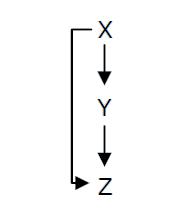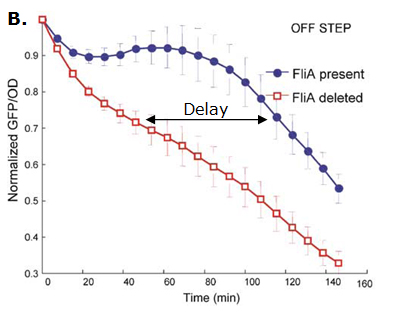Paris/FFL
From 2008.igem.org
(→The type 1 coherent Feed Forward Loop with an OR gate introduces a delay after the extinction of the signal) |
(→The type 1 coherent Feed Forward Loop with an OR gate introduces a delay after the extinction of the signal) |
||
| (6 intermediate revisions not shown) | |||
| Line 1: | Line 1: | ||
| - | |||
| - | |||
| - | |||
| - | |||
===Definition of a FFL=== | ===Definition of a FFL=== | ||
[[Image:Ffl.JPG|thumb|left|100px| Fig. 1 : Structure of a type 1 coherent Feed Forward Loop]] | [[Image:Ffl.JPG|thumb|left|100px| Fig. 1 : Structure of a type 1 coherent Feed Forward Loop]] | ||
| Line 11: | Line 7: | ||
<br> | <br> | ||
Depending on the type of regulations between the different nodes, we can define eight types of FFL that can be classified into two groups : ''coherent'' and ''incoherent'' FFLs. In ''coherent'' FFLs, the indirect path has the same overall sign as the direct path. The most abundant FFL is the type-1 coherent FFL (C1-FFL) ''(Figure 1)''. | Depending on the type of regulations between the different nodes, we can define eight types of FFL that can be classified into two groups : ''coherent'' and ''incoherent'' FFLs. In ''coherent'' FFLs, the indirect path has the same overall sign as the direct path. The most abundant FFL is the type-1 coherent FFL (C1-FFL) ''(Figure 1)''. | ||
| - | + | <br><br><br> | |
===The type 1 coherent Feed Forward Loop with an OR gate introduces a delay after the extinction of the signal=== | ===The type 1 coherent Feed Forward Loop with an OR gate introduces a delay after the extinction of the signal=== | ||
| - | [[Image:OR | + | [[Image:OR gate3.JPG|thumb|350px|Fig. 2 : The C1-FFL with OR logic in the flagella system of ''E. coli''.]][[Image:Delay.JPG|thumb|350px|Fig. 3 : Promoter dynamics after an OFF step of X, in the presence of Y. The results are shown for the wild-type bacterium, and for a bacterium in which the gene for Fli1 was deleted from the genome. The FFL generates a delay after an OFF step of X]] |
<br> | <br> | ||
| Line 24: | Line 20: | ||
If the input function of the promoter of the gene Z is "OR", Z is expressed when X activity is high. There is no delay following the expression of X. But when X is not expressed anymore, its concentration decreases and reach the activation threshold of Y and Z. Y is not expressed anymore but as the concentration decreases, Z is still expressed. '''The OR-gate C1-FFL allow the gene Z to be expressed about one more hour after the gene X is OFF.''' ''(Figure 3)'' | If the input function of the promoter of the gene Z is "OR", Z is expressed when X activity is high. There is no delay following the expression of X. But when X is not expressed anymore, its concentration decreases and reach the activation threshold of Y and Z. Y is not expressed anymore but as the concentration decreases, Z is still expressed. '''The OR-gate C1-FFL allow the gene Z to be expressed about one more hour after the gene X is OFF.''' ''(Figure 3)'' | ||
| + | ===Bibliography :=== | ||
| + | * [http://www.nature.com/ng/journal/v31/n1/abs/ng881.html Shen-Orr ''et al''. (2002)] | ||
| - | + | * [http://www.ncbi.nlm.nih.gov/pubmed/14607112?ordinalpos=1&itool=EntrezSystem2.PEntrez.Pubmed.Pubmed_ResultsPanel.Pubmed_DefaultReportPanel.Pubmed_RVDocSum Mangan ''et al''. (2003)] | |
| - | + | ||
| - | + | ||
| - | + | ||
| - | + | ||
| - | + | * [http://www.ncbi.nlm.nih.gov/pubmed/14530388?ordinalpos=2&itool=EntrezSystem2.PEntrez.Pubmed.Pubmed_ResultsPanel.Pubmed_DefaultReportPanel.Pubmed_RVDocSum Mangan ''et al''. (2003)] | |
| - | + | * [http://www.pubmedcentral.nih.gov/articlerender.fcgi?tool=pubmed&pubmedid=16729041 Kalir ''et al''. (2005)]'' | |
| - | + | ||
Latest revision as of 03:12, 30 October 2008
Contents |
Definition of a FFL
A Feed-Forward Loop is a genetic network composed of three nodes. This strong network motif is composed of a transcription factor X that regulates a second transcription factor, Y, and both X and Y regulate Z (Figure 1).
The different types of FFL
Depending on the type of regulations between the different nodes, we can define eight types of FFL that can be classified into two groups : coherent and incoherent FFLs. In coherent FFLs, the indirect path has the same overall sign as the direct path. The most abundant FFL is the type-1 coherent FFL (C1-FFL) (Figure 1).
The type 1 coherent Feed Forward Loop with an OR gate introduces a delay after the extinction of the signal
In addition to the signs of the edges, to understand the dynamics of the FFL, we must also know how the inputs from the two regulators X and Y are integrated at the promoter of the gene Z. Uri ALON considers that there are two biologically reasonable logic functions : "AND" logic, in which both X and Y activities are need to be high in order to turn on Z expression and "OR" logic in which either X or Y is sufficient (Figure 2).
If the input function of the promoter of the gene Z is "OR", Z is expressed when X activity is high. There is no delay following the expression of X. But when X is not expressed anymore, its concentration decreases and reach the activation threshold of Y and Z. Y is not expressed anymore but as the concentration decreases, Z is still expressed. The OR-gate C1-FFL allow the gene Z to be expressed about one more hour after the gene X is OFF. (Figure 3)
Bibliography :
- [http://www.nature.com/ng/journal/v31/n1/abs/ng881.html Shen-Orr et al. (2002)]
- [http://www.ncbi.nlm.nih.gov/pubmed/14607112?ordinalpos=1&itool=EntrezSystem2.PEntrez.Pubmed.Pubmed_ResultsPanel.Pubmed_DefaultReportPanel.Pubmed_RVDocSum Mangan et al. (2003)]
- [http://www.ncbi.nlm.nih.gov/pubmed/14530388?ordinalpos=2&itool=EntrezSystem2.PEntrez.Pubmed.Pubmed_ResultsPanel.Pubmed_DefaultReportPanel.Pubmed_RVDocSum Mangan et al. (2003)]
- [http://www.pubmedcentral.nih.gov/articlerender.fcgi?tool=pubmed&pubmedid=16729041 Kalir et al. (2005)]
 "
"

